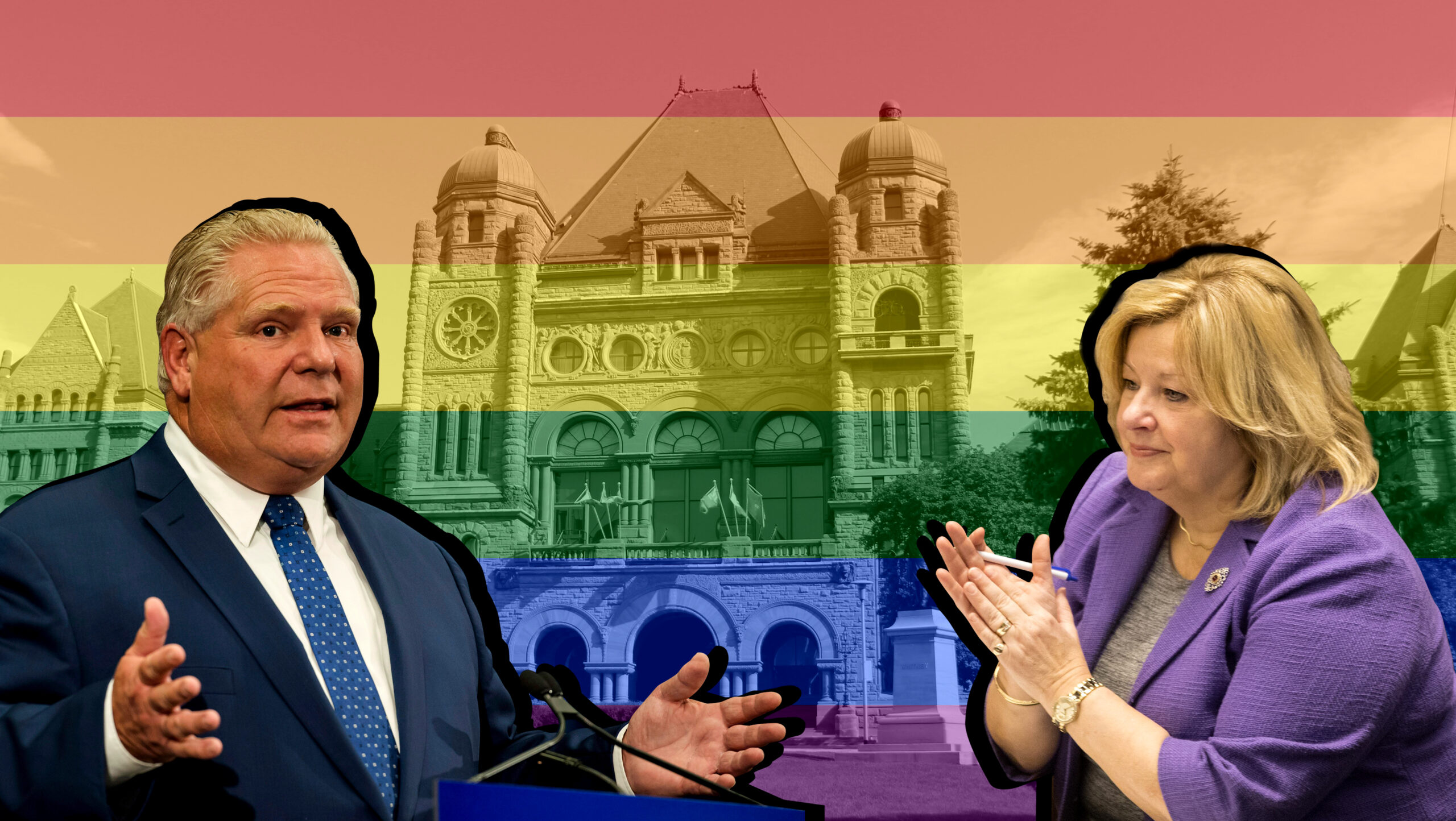In May, the Ontario Conservative government, led by Premier Doug Ford, will release the full details of its new sex-ed curriculum. There will be some notable changes from the curriculum updated in 2015 by the previous Liberal government: gender identity, for example, will be taught in Grade 8 instead of Grade 3. Parents will also be able to pull their children out of the new curriculum at any point and will instead be provided with online modules from the Ministry of Education to teach at home.
The new curriculum may seem like a win after the expectation that Ford’s government would implement a regressive, interim version of sex ed.
But left out of the conversation are the 30 percent of students in Ontario who attend publicly funded Catholic schools. It’s unlikely they’ll receive the full benefits of the new curriculum.
Ever since human sexuality was taught in Canadian public schools, the Catholic Church, through the Assembly of Catholic Bishops of Ontario (ACBO), has negotiated with the Ministry of Education to teach parts of the curriculum from a faith-based angle, and to be exempt from teaching other parts entirely. In practice, this means several differences between the way sex ed is taught in public and public-Catholic school boards, both of which are government funded in Ontario. (They’re also publicly funded in Saskatchewan and Alberta.)
For queer students in particular, this can mean exclusion from crucial, life-saving education.
In public schools, sex ed is generally taught in health class. At its best, this means students are given the information they’ll need to be healthy going forward in their lives without moral judgment attached. Students are taught about contraception and safe sex, for instance, but the matters of when or why to have sex are left up to them.
Meanwhile, in Catholic schools, religious teachings and the principles of faith shape the context of sex ed. Students may be told how to have safe sex but then be instructed to avoid it before marriage and to only have it for reproductive purposes, meaning contraception is classified as sinful. Masturbation is shamed, there isn’t comprehensive education regarding sexually transmitted infections (abstinence is taught instead) and a “love the sinner, hate the sin” approach is taken regarding queer relationships.
The ACBO also negotiates to ensure that Catholic schools can use textbooks approved by the Canadian Conference of Bishops, their parent organization. The result for elementary schools is the “Fully Alive” education program and textbook series, which is rife with harmful misinformation and operates from a blatant heteronormative perspective, leaving out queer students. The Institute for Catholic Education’s description of the series explicitly notes that “the entire program, from Grade 1 through Grade 8 is designed to encourage children to become the people God wants them to be.”
While there certainly are Catholic school teachers interested in teaching sex ed in a more progressive and accurate way, all teachers must attend training workshops with bishops on appropriate methods of teaching sex ed. Teachers are then left with a choice: comply, or run with a more liberal curriculum provided by the province.
Those who opt for the latter might find themselves being called into meetings with administrators, where they’re grilled on why they didn’t follow the bishop-enforced party line, according to Tonya Callaghan, a former Catholic school teacher and the author of Homophobia in the Hallways: Heterosexism and Transphobia in Canadian Catholic Schools.
“Relying on Catholic doctrine as a guide for curricular and policy decisions makes Canadian Catholic schools hotbeds for homophobia,” Callaghan writes. “Within Catholic schools, LGBTQ2 students are treated as though they have a disease that must be ‘cured,’ and LGBTQ2 teachers who are not adept at hiding their sexual orientations are sometimes fired from their jobs or, at best, harassed.”
The Ontario government’s new curriculum will not solve these problems because, Callaghan tells me, Catholic education leaders will be able to find loopholes to avoid teaching components they don’t agree with, as they’ve done before — even with the 2015 curriculum.
This is not just possible but likely, as Callaghan writes in her book that Canadian bishops made sexuality in the school system one of their top concerns following the “highly publicized advancements of same-sex legal rights in Canada” in the early 2000s, which “suggests a Catholic backlash to Canadian equality rights laws for sexual minority groups.”
Public Catholic schools are, by virtue of their funding, legally accountable to elected officials in our secular system, not to bishops. The simple answer, it seems, would be to push Catholic schools to comply with provincial regulations, and teach the standard, secular sex-ed curriculum.
But there’s little indication they’ll do that. Callaghan writes in her book that while same-sex legal rights in Canada as a whole have been “steadily advancing,” in public-Catholic schools they’ve been “virtually non-existent.”
The examples are numerous: In 2012, the provincial Liberal government in Ontario had to enforce legislation requiring Catholic schools to allow students to create Gay-Straight Alliances, after students at a school in Mississauga, Ontario, were prevented from doing so in 2011. The legislation also states students must be able to use the word “gay” in the name of the groups, which the Catholic school board opposed, seeing it as “too affirming of non-heterosexuality,” according to Callaghan.
A decade earlier, in 2002, high school student Marc Hall was forced to take his Oshawa, Ontario, Catholic school to court in order to bring his boyfriend to prom. Last year, a youth theatre group in London, Ontario, planned to produce a play about Hall’s battle, but the London District Catholic School Board pulled its funding from the project, claiming that the play “portrays the Catholic Church as something that is rigid, not inclusive, not accepting, not welcoming.”Meanwhile, in Alberta, a former principal in Calgary’s Catholic school board system launched two human rights complaints against the district, alleging she was forced to resign because she’s married to a woman.
The only way to solve this problem? Defund Catholic schools in Ontario entirely and merge them into a single, public system.
The separate Catholic system was introduced in several provinces, including Ontario, in 1867, as a concession to a Catholic-minority concerned with having their rights guaranteed in the face of Protestant majorities. These conditions no longer apply, as Catholics are the largest religious denomination in Ontario and Alberta, at 31.4 and 24.3 percent of the population respectively, according to the 2011 National Household Survey from Statistics Canada. Moreover, an increasing number of non-Catholic students attend Catholic schools because their parents see them as a better option, for reasons such as convenience, proximity and sometimes a belief that these schools offer a better education.
In 1999 and 2005, the United Nations Human Rights Committee ruled that Canada is violating the International Covenant on Civil and Political Rights by funding only Catholic schools and no other religious-affiliated schools. The system has also been critiqued from a fiscal angle, with a 2012 report from the Federation of Urban Neighbourhoods (Ontario) Inc finding Ontario could save up to $1.6 billion annually by merging the systems.
Public-Catholic systems also used to exist in Quebec and Newfoundland, but they were able to overturn them in the late 1990s through constitutional amendments. In Quebec, the legislature unanimously voted to end funding for Catholic schools, and in Newfoundland, 73 percent of people voted for the same in a referendum. Both of these resolutions were then approved at the federal level.
In 2017, Newfoundland’s premier, Brian Tobin, told CBC Radio’s On The Go, “I’m very proud of what we did and I’m proud of the people of Newfoundland and Labrador to embrace the future instead of being chained to the past.” Tobin added that the move, which he says saved children from an inferior education due to economic difficulties, is no longer seriously opposed by anyone despite being contentious at the time.
For Ontario to follow in these provinces’ footsteps, all it would take is a resolution being passed at Queen’s Park, and then at Parliament. This is of the utmost importance for a better future, so at least one of the provincial parties needs to step up and get the process started regardless of the political backlash it may cause.
Updating the curriculum was essential, but where it’s being taught, and by whom, also matters. The Catholic school system has shown it’s beyond redemption on these issues. It cannot, and should not, be saved.
Legacy: April 22, 2019 1:00 pmA previous version of this story incorrectly referred to Marc Hall as Marc Hill. The story has been updated.


 Why you can trust Xtra
Why you can trust Xtra


